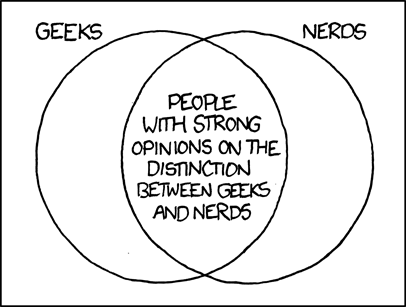You are using an out of date browser. It may not display this or other websites correctly.
You should upgrade or use an alternative browser.
You should upgrade or use an alternative browser.
Geek or Nerd
- Thread starter frank_grimes
- Start date
More options
Thread starter's postsSoldato
- Joined
- 22 Mar 2009
- Posts
- 7,754
- Location
- Cornwall
Geeks like women; Nerds like Star Trek.
i dislike star trek, but i also dislike wanting to be in a carnival, i must be neither.
Man of Honour
- Joined
- 17 Feb 2003
- Posts
- 29,640
- Location
- Chelmsford
You called?
I did, it's high time you walked my plank young sir.

Soldato
- Joined
- 15 Aug 2007
- Posts
- 15,788
- Location
- Outside in the bushes
I did, it's high time you walked my plank young sir.

Steady now or Mutiny may be afoot!

Caporegime
- Joined
- 28 Jun 2007
- Posts
- 52,812
- Location
- Tamworth, UK
My friends say I'm a geek but deep down, I know I'm a nerd 

Associate
- Joined
- 22 Aug 2004
- Posts
- 462
- Location
- East Sussex
Man of Honour
- Joined
- 17 Feb 2003
- Posts
- 29,640
- Location
- Chelmsford
Man of Honour
- Joined
- 17 Nov 2003
- Posts
- 36,750
- Location
- Southampton, UK

Geek is getting to the point where it's not really derogatory anymore. Haven't you heard of geek chic?
Hipsters hanging round the apple store wearing black rimmed glasses and skinny jeans.... etc.. ?
more likely arts students than physicists....
If they're geeks then Dappy from N Dubz is a 'gangster'.
Soldato
- Joined
- 7 Jul 2009
- Posts
- 16,234
- Location
- Newcastle/Aberdeen
Hipsters? Now there's a meaningless term.
Hipsters? Now there's a meaningless term.
In what way is it meaningless?
Seems to have as much meaning as any other term describing general groups fitting a particular stereotype.
edit - oops spelling
Last edited:
Soldato
- Joined
- 7 Jul 2009
- Posts
- 16,234
- Location
- Newcastle/Aberdeen
In what way is it meaningless?
Seems to have as much meaning as any other term describing general groups fitting a particular steriotype.
It doesn't even describe a stereotype though. It's just used when referring to people that "i don't like". Sometimes that could be people with some sort of clothing style. Sometimes it could be people who like, say, a film. Other times it could be people who don't like a film.
Even then that falls down when some people will happily call themselves hipsters.
It doesn't even describe a stereotype though. It's just used when referring to people that "i don't like". Sometimes that could be people with some sort of clothing style. Sometimes it could be people who like, say, a film. Other times it could be people who don't like a film.
Even then that falls down when some people will happily call themselves hipsters.
erm not really - its no different to chav, geek, nerd, jock, emo, punk, goth or even mod or rocker from the 60s...
for reference:
and
and more recently:
http://www.vice.com/en_uk/dalston-superstars/dalston-superstars
also so 'being a ****head is cool' (obv can't link here)
and www.latfh . com (again can't directly link due to sweary)
Last edited:
Soldato
- Joined
- 7 Jul 2009
- Posts
- 16,234
- Location
- Newcastle/Aberdeen
What's your definition then?
as above.... those videos give a better illustration of the term but if you want a written defenition then:
http://en.wikipedia.org/wiki/Hipster_(contemporary_subculture)
http://en.wikipedia.org/wiki/Hipster_(contemporary_subculture)
Hipster (also referred to as scenesters[1]) is a term frequently used to refer to a subculture of young, recently settled urban middle class adults and older teenagers. Usage of the term reappeared in the 1990s and persists to the present. The subculture is associated with independent music, a varied non-mainstream fashion sensibility, and alternative lifestyles. Interests in media would include independent film, magazines such as Vice and Clash, and websites like Pitchfork Media.[2]
Hipster culture has been described as a "mutating, trans-Atlantic melting pot of styles, tastes and behavior."[2] Christian Lorentzen of Time Out New York argues that "hipsterism fetishizes the authentic" elements of all of the "fringe movements of the postwar era—beat, hippie, punk, even grunge," and draws on the "cultural stores of every unmelted ethnicity," and "regurgitates it with a winking inauthenticity."[3] Others, like Arsel and Thompson, argue that hipster signifies a cultural mythology, a crystallization of a mass-mediated stereotype generated to understand, categorize, and marketize indie consumer culture, rather than an objectified group of people.[4]
Last edited:
Soldato
- Joined
- 7 Jul 2009
- Posts
- 16,234
- Location
- Newcastle/Aberdeen
What, people who hang around apple stores?




